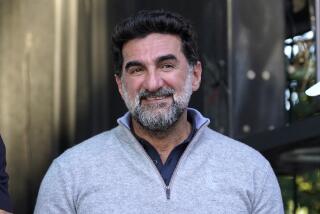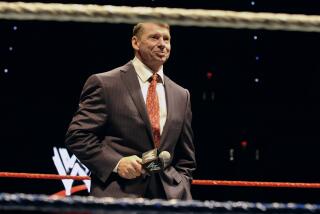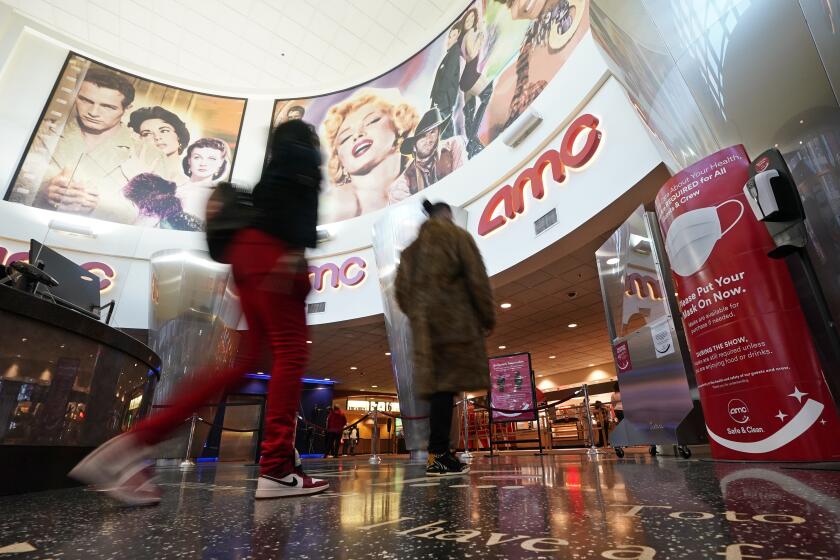Callaway Golf Receives a Second Buyout Offer
- Share via
A second bidder has teed up an offer for Callaway Golf Co., increasing the chances that the world’s largest club manufacturer will be taken private, according to sources with knowledge of the situation.
Bain Capital Inc., a Boston-based investment firm, and MacGregor Golf, one of the oldest names in golf equipment, put a joint, all-cash offer on the table a week ago that values Callaway, best known for its Big Bertha line of clubs, at as much as $1.24 billion, sources said.
A spokesman for Bain declined to comment on a possible deal, as did MacGregor President Dana Shertz. Callaway spokesman Larry Dorman said “no substantive discussions currently are underway.”
At about $16.25-a-share, the offer would be slightly higher than an unsolicited, all-cash offer made in late May by buyout firm Thomas H. Lee Partners and the insurance giant Fidelity National Financial Inc.
Thomas Lee and Fidelity had made their bid contingent on securing financing. Sources close to that team said Wednesday that the partners informed the Callaway board last week that funding was in place for an offer that values the company at $16 a share, or about $1.2 billion.
“We haven’t delivered anything formal,” said William Foley, Fidelity’s chief executive, adding that he and his bidding partners did not want to be perceived as making a hostile gesture or giving the board an ultimatum. But he said the bid, which Callaway has not responded to, would not be extended indefinitely.
“We’ve tried to be very patient,” Foley said, adding that his team might be willing to pay more than $16 a share if a review of Callaway’s books revealed no surprises.
Both buyout offers are above Callaway’s stock price, which has been hovering around the $15-a-share mark since the Thomas Lee-Fidelity offer was first reported in The Times in June. Before that, the stock had been trading below $11 a share. The stock closed Wednesday at $14.90, unchanged.
Callaway has hired New York investment banking firm Lazard Ltd. to explore strategic options including a possible sale. To date, the board has not held any negotiations with either bidder.
Callaway has struggled to fill a leadership void created by the 2001 death of Ely Callaway, its charismatic founder.
This week, the company’s board named George Fellows chief executive, a move that some investors viewed as evidence that the board was intent on remaining independent. Fellows, a former Revlon chief executive, was hired to replace William Baker, who had been serving as interim chief since a management shake-up at the company last summer.
Sources close to the situation, however, say that Fellows may have an incentive under his new contract to sell the company. His contract specifies that if Callaway’s ownership changes, he gets a multimillion-dollar payout, sources said.
Baker, a close ally of the late founder, has supported a sale of the company, as have two other members of Callaway’s top management, according to sources close to the executive. But sources close to the company say some other board members have been resistant to a takeover.
On Monday, Callaway announced that Baker would step down as chairman, but stay on the board. Ronald S. Beard, an independent board member, will replace him as chairman.
Sources say a special committee of independent board members assembled to assess the bids has been trying to delay any sale in the hope of improving the company’s stock price.
Many analysts and investors view an offering price of $16 a share as fair, although the strength of Callaway’s recent quarterly earnings has inspired some to push for $17 a share. Carlsbad, Calif.-based Callaway’s results have suffered amid an industrywide slump in golf equipment sales.
Either bid would turn Callaway into a privately held company. Under the Bain bid, Callaway would be merged into San Diego-based MacGregor Golf and run by that company’s respected chief, Barry Schneider, sources said.
If the Lee-Fidelity offer is accepted, sources say, Callaway probably will move its manufacturing to a foreign country.
Top Callaway executives support the move to take the company private, insiders say, because they believe Wall Street’s emphasis on quarter-to-quarter growth has hurt product quality and innovation. In their view, removing such pressures would revive the spirit of innovation that distinguished the company under its late founder.
The latest buyout offer underscores the closely knit nature of the golf club manufacturing business. Before joining MacGregor, Shertz worked in sales and executive positions at Callaway from 1987 to 2001.
More to Read
Inside the business of entertainment
The Wide Shot brings you news, analysis and insights on everything from streaming wars to production — and what it all means for the future.
You may occasionally receive promotional content from the Los Angeles Times.









